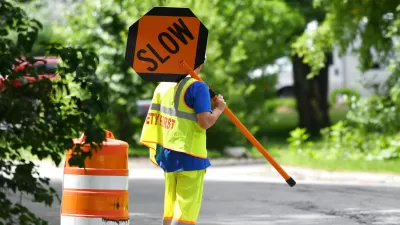Roberta Brandes Gratz examines New Orleans' Lower Ninth Ward to make the case that even neighborhoods past their prime are worth fighting for.
When New York's South Bronx started hemorrhaging residents in the 1970s, it pursued a policy of "planned shrinkage," whereby the city scaled back its services in hopes of consolidating residents into a smaller, more manageable area. But that school of thought, Gratz charges, only gives cities momentum to keep on shrinking.
So when the remaining residents of South Bronx were left with piles of uncollected garbage, broken streets, and closed schools and fire stations, they had to rebuild without the City's help. "[They] fought back fiercely, refused to leave, took over vacant buildings, fixed them up on their own, stuck it out with minimum city services, and, with mottos like 'improve don't move,' set about on a sweat equity path that was the catalyst for a slow, incremental citywide rebound... That is why New York grew again, instead of shrank."
And now, seven years after Hurricane Katrina left New Orleans in shambles, the same "slow, incremental rebound" is taking place in the city's Lower Ninth Ward. Though the neighborhood received "few dollars and little energy" from official relief efforts and continues to see the tropical wilderness slowly encroaching on the landscape, "clusters of rebuilt houses and new construction are not hard to find. The sound of the hammer or buzzsaw is ubiquitous."
"Officials too often assume shrinkage is inevitable. But do they ever inquire of the diehard hold-outs why they stay? The answers are clues to regeneration instead of assumptions of continued loss."
FULL STORY: What Cities Looking to Shrink Can Learn From New Orleans

Maui's Vacation Rental Debate Turns Ugly
Verbal attacks, misinformation campaigns and fistfights plague a high-stakes debate to convert thousands of vacation rentals into long-term housing.

Planetizen Federal Action Tracker
A weekly monitor of how Trump’s orders and actions are impacting planners and planning in America.

Chicago’s Ghost Rails
Just beneath the surface of the modern city lie the remnants of its expansive early 20th-century streetcar system.

Bend, Oregon Zoning Reforms Prioritize Small-Scale Housing
The city altered its zoning code to allow multi-family housing and eliminated parking mandates citywide.

Amtrak Cutting Jobs, Funding to High-Speed Rail
The agency plans to cut 10 percent of its workforce and has confirmed it will not fund new high-speed rail projects.

LA Denies Basic Services to Unhoused Residents
The city has repeatedly failed to respond to requests for trash pickup at encampment sites, and eliminated a program that provided mobile showers and toilets.
Urban Design for Planners 1: Software Tools
This six-course series explores essential urban design concepts using open source software and equips planners with the tools they need to participate fully in the urban design process.
Planning for Universal Design
Learn the tools for implementing Universal Design in planning regulations.
planning NEXT
Appalachian Highlands Housing Partners
Mpact (founded as Rail~Volution)
City of Camden Redevelopment Agency
City of Astoria
City of Portland
City of Laramie





























